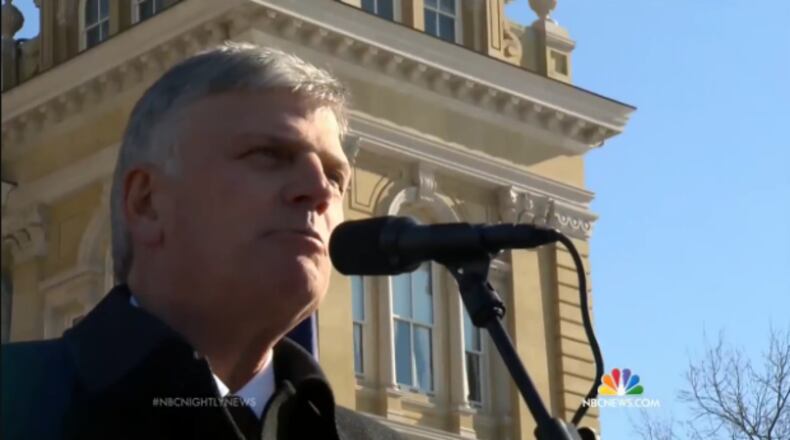On Sunday, Scott Slade of WSB Radio aired an interview with the Rev. Franklin Graham, who comes to the state Capitol on Wednesday – part of Graham's nationwide effort to push evangelicals to the polls.
The son of Billy Graham made clear the chief motivation for his noon rally: Opposition to gay marriage and the transgender movement. “I see this as a major failure of our nation,” Graham said. Listen here:
Slade first asked Graham the general purpose of his visit:
"I think this could be the most important election, maybe, in my lifetime. Because we're at a crossroads. The Democratic party wants to take the route of socialism. They want the United States to become a socialist country. And that's not what built America. The free enterprise system, capitalism, built this nation. They want to destroy it and turn it into something else.
"What's happened is that the evangelical vote has not been heard. I want them to get out and at least make their vote count. Now, I don't have any faith in the Republican party, and I don't have any faith in the Democratic party. I believe the only hope, really, is God…."
But then the evangelical leader shifted gears. Slade asked Graham why this presidential election was different from the last two or three:
"It's just the beginning of a moral onslaught on this nation."
Slade noted that some people think the LGBT community “belongs under God’s tent. Replied Graham:
Graham said he wouldn’t be endorsing any presidential candidates while he’s here, but his rally, to be held at Liberty Plaza across from the Capitol, could have an impact on several "religious liberty" measures now before the General Assembly.
***
The website WalletHub has ginned up these personal financial statistics about the 2016 presidential field:
• $6.5M: The average candidate's cash savings (vs. less than $1,000 for most Americans);
• ≤$1K: Bernie Sanders cash savings (and it's in his wife's name);
• $73,250: The average candidate's average speaking fee;
• $231,059: Hillary Clinton's average speaking fee;
• $4.5M: Ben Carson's overall income from speeches;
• 9: Donald Trump owns nine properties worth at least $50 million;
• $0: Jeb Bush and Hillary Clinton have no liabilities listed on their financial disclosures;
• - $150K: Roughly Marco Rubio's net worth, with his liabilities outweighing his assets.
***
The Hillary Clinton campaign will hold a Tuesday kick-off rally at the state Capitol. Followed by a bit of phone-banking in Marietta. Then more phone-banking on Saturday.
We know this not because the Clinton campaign has informed us of the events, but because they sent their email to Doug Chalmers, a prominent GOP attorney. Wrote Chalmers:
"Inasmuch as I'm on the board of directors of the Republican National Lawyers Association, my enthusiasm for Hillary Clinton's candidacy is probably not the same as yours. Please unsubscribe me from this nefarious list."
***
In-person, early voting for Georgia's March 1 presidential primary begins today, and several metro Atlanta counties have boosted their hours or added additional locations since the last presidential election.
Absentee voting by mail has already started across the state, and more Georgians than ever are eligible to cast a ballot for the March 1 presidential primary. More than 54,000 people registered to vote or updated their registration status using an online system, setting a record for the state's online voter registration system.
***
None of Georgia's top officeholders are sitting on mountains of cash. The latest campaign disclosures, filed over the last week, show Lt. Gov. Casey Cagle has about $250,000. House Speaker David Ralston reports $241,000 in his account. Secretary of State Brian Kemp has roughly $190,000. And Attorney General Sam Olens clocked in at $81,000.
And Gov. Nathan Deal?
The latest disclosure reports show his campaign account with only about $26,000 after raising zip the last reporting cycle. Of course, he can't run for re-election, but he can use the money to help political allies or boost causes.
***
Lawmakers of all political stripes love to rant about how the federal budget process is broken, but few can agree on any substantive way to fix it.
David Perdue, a member of the Senate Budget Committee, is taking his turn at the plate. The Republican is introducing a bill today that would drastically shift the way federal agencies ask for money from Congress.
The businessman’s proposal would require agencies to adhere to a process that’s been utilized in the private sector and in states such as Georgia that requires them to justify every dollar they’re requesting. (Agencies currently use their prior year spending plans as baselines.)
Its supporters, including Jimmy Carter when he was president, say so-called zero-based budgeting makes for more efficient and less wasteful spending plans. Opponents say it’s too costly and unwieldy for an institution the size of the federal government.
Perdue’s bill would also force lawmakers to account for Social Security spending when drawing up their annual budget blueprints but stops short of mandating any sort of changes to the program, which is essentially funded on autopilot by the government.
“Without an honest and accurate assessment of the federal balance sheet, Americans don’t know what the government takes in and what it spends. There should be no hidden trust funds or unaccountable spending programs,” Perdue said in a statement.
Very little will get done this year in Congress because of the elections, but the chairmen of the House and Senate Budget Committees say they plan to use this year’s legislative lull to overhaul the budget process.
It’s possible that portions of Perdue’s measure could make it into any potential new bill. But that doesn’t change the fact that anything that proposes tweaking entitlements such as Social Security is considered politically toxic in Washington, making it very difficult for Perdue to ultimately see any of his proposed changes enacted into law.
About the Author
The Latest
Featured




